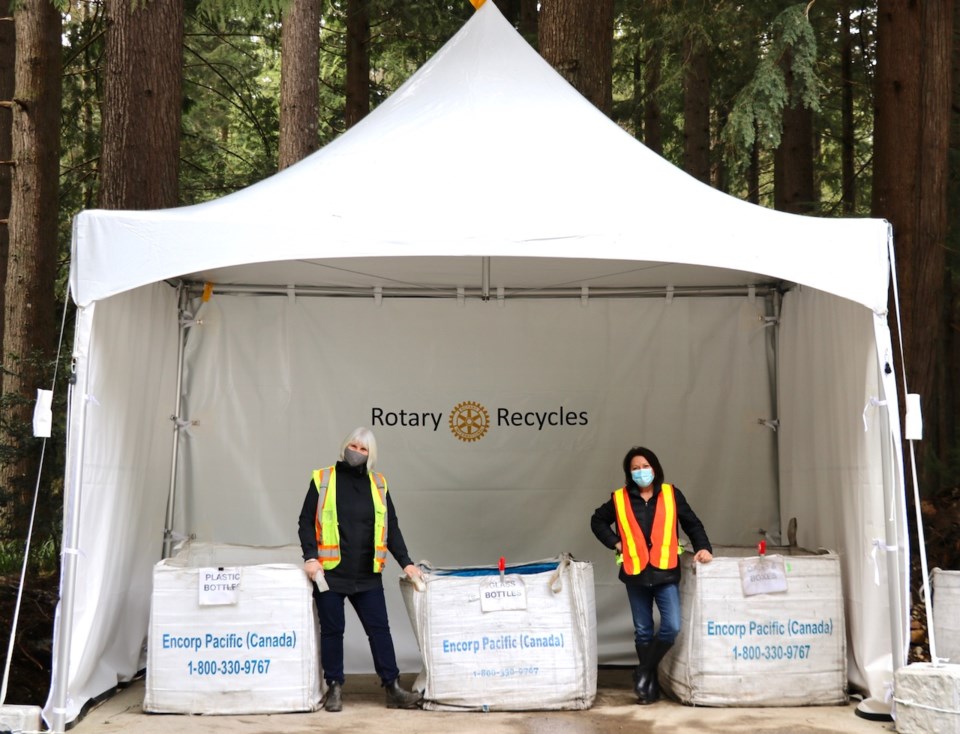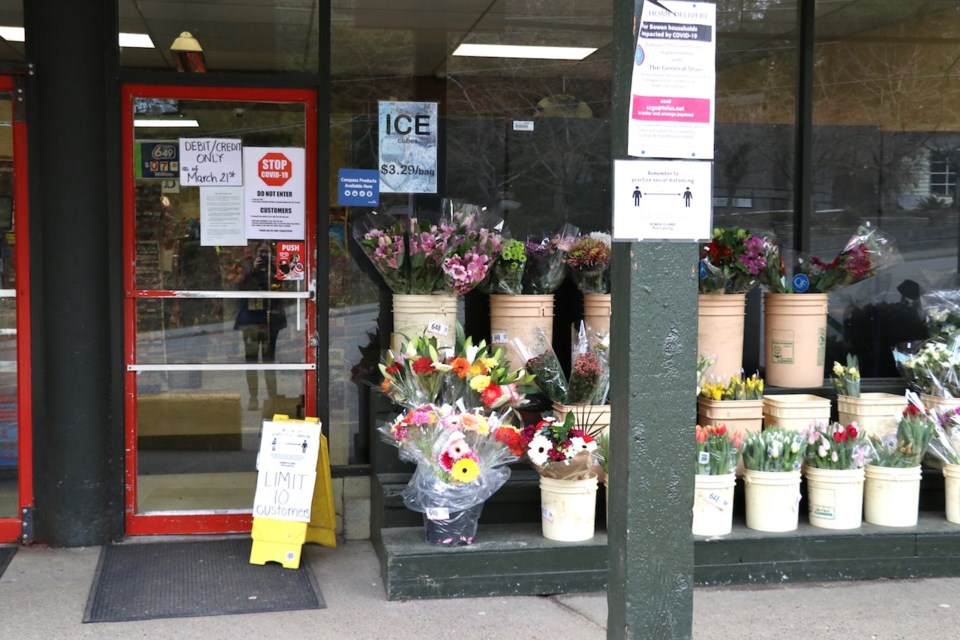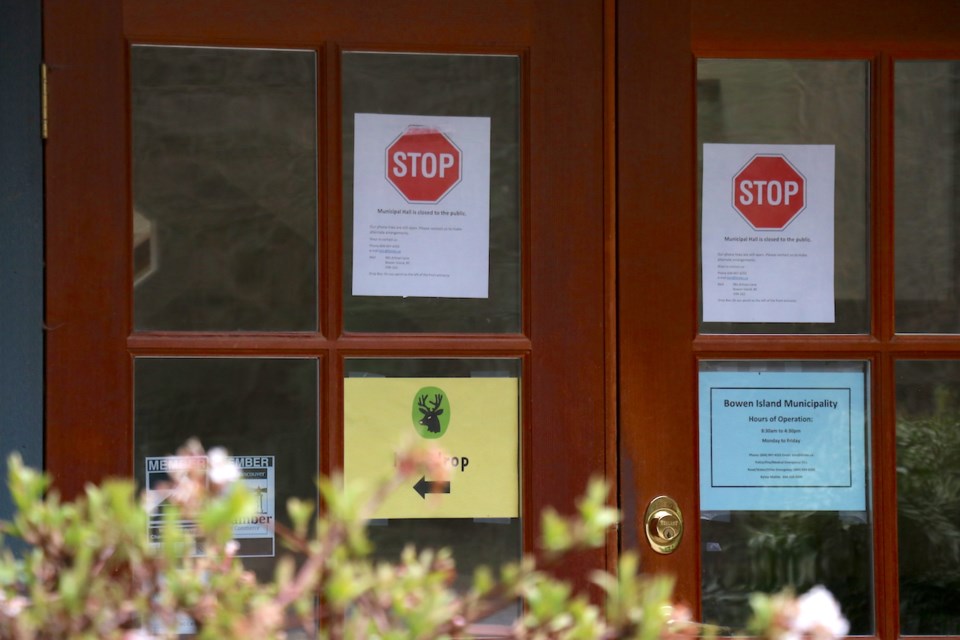Everything changed for the Undercurrent with our March 19, 2020 edition. Group photos and Bowen Beat disappeared and in their places was as much pandemic information as we could fit into these pages. It’s difficult to measure the virus’s effect on this community – a year without gatherings in a community that loves festivals will take its toll – but we chatted with a few locals about what they’ve seen both on Bowen and regionally.
 Louise McIntosh and Jan Seaman in the new refundables tent at BIRD in March 2021. By Bronwyn Beairsto
Louise McIntosh and Jan Seaman in the new refundables tent at BIRD in March 2021. By Bronwyn BeairstoLouise McIntosh and Jan Seaman, Bowen Waste Solutions
While the effect on waste wasn’t immediate when COVID-19 hit, Bowen Waste Solutions has seen a change in what islanders throw in their bins.
As folks started working from home, Bowen Waste started seeing people do more “spring cleaning,” getting into closets, pantries and downsizing what they had, said Jan Seaman. “Because now they’ve got the time to do it.”
The company has seen an increase in calls for curbside pickups as islanders dig into renovations, crawlspaces, new decks and gardening.
When it came to organics, Bowen Waste saw increases in green waste from gardening and food waste from those now doing more home cooking. “Along with baking bread in their kitchens, people were starting gardens in their yard,” said Bowen Waste owner Louise McIntosh.
“We’ve probably had an increase of almost 30 per cent in non-regular residential pickup things that align themselves with cleanups renovations from yards to homes,” said McIntosh. This was a discussion across the Metro Vancouver communities, she said, because within about three months, everybody was showing a large increase in household garbage because of people spending more time at home.
At the recycling depot, they’ve noticed more flattened cardboard from online shopping as well.
When the pandemic first hit, Bowen Island Recycling Depot closed. “If you want to freak out a community, close down their recycling depot for a couple of weeks,” said McIntosh. “We were getting calls that people didn’t know what to do with all this stuff on their porch.”
In the year since, COVID protocols have evolved. They’re now letting six people into the depot at a time and have also moved some things (like the refundables drop off) outside.
When it comes to how the depot is set up, some changes – like the new refundables tent – will likely be permanent as they’ve proven efficient.
And through the pandemic, Bowen Waste didn’t have to lay off any staff. “We’re very proud…all staff kept working through from start to finish,” said Seaman.
 Snug Cove General Store as it was in March 2020 – its protocols have since evolved over the course of the past year. . By Bronwyn Beairsto
Snug Cove General Store as it was in March 2020 – its protocols have since evolved over the course of the past year. . By Bronwyn BeairstoNancy Lee, Snug Cove General Store
Nearly overnight, Snug Cove General Store went from social hub to essential service last March. Islanders were urged to visit the store no more than once a day – or even better once a week – and only a few customers were allowed inside at a time (as is still the case).
Week by week, staff figured out how to do pick-ups, deliveries, ordering and maintaining the business during the emergency.
“Personally, I think I feel a little bit safer since Bonnie Henry made it mandatory for the masks,” said general manager Nancy Lee. “At the beginning, masks weren’t mandatory and just some people were wearing them.”
The store is still doing the online ordering and Lee says they have probably about a dozen customers who are consistently ordering online. There are also now customers who weren’t necessarily regulars before who are now not going to town to buy groceries.
But when it comes to how often people are visiting the store, customers have reverted to pre-pandemic habits. “It was better at the beginning,” said Lee. “People were trying to do more of a big shop.
“Now we’re basically back to before – people coming in every day. Two, three times a day. Coming in to buy one item.”
Now with the lineup, masks, hand sanitizer, and limiting the number of people coming in, Lee has made peace with folks visiting more than once a day.
But, she reminds folks that they really must sanitize their hands using the foot pedal operated sanitizer dispenser at the entrance.
Also, reusable shopping bags are once again allowed (they weren’t for a while in the early to mid days). “We can’t forget about Mother Nature – we need to start getting back on to that,” said Lee.
Mayor Gary Ander, Bowen Island Municipality
Bowen Island Municipality activated its virtual emergency operations centre March 18 to coordinate its pandemic response. The day before, municipal hall closed to the public and the first virtual council meeting took place March 23 as BIM grappled with managing the pandemic.
The emergency operations centre demobilized June 26 as COVID-19 response was absorbed into “regular municipal operations.”
“Every day was a different scenario,” recalled Mayor Gary Ander of the early days. “Those were pretty scary times…before we got a handle on it and figured out how to find our way through.”
“As far as the municipality is concerned, we’ve been managing to operate, obviously, but under totally different circumstances.” BIM moved some services online and has forged ahead with several capital projects including the water treatment plant, multi use path, fire hall and community centre (the referendum for which was held entirely during the pandemic).
“I’ve got to credit the people on Bowen Island because they’ve done a really incredible job,” said Ander. “Not that it’s over by any stretch of the imagination, and we’ve still got days ahead of us, but the vaccinations are coming.”
“People looked after everybody, and I think we’re in a fairly good position coming out of this.
“We’ve been pretty fortunate on Bowen Island because we’re semi isolated,” said Ander. “We certainly didn’t have the dramatic lifestyle change as far as the isolation and that sort of thing as you would have seen in Vancouver.
“Because we are very rural and we have a forest …we can get out into nature and do our walking and everything else.
“I don’t think it’s had the impact that it’s had in Vancouver,” said Ander. “Obviously, it’s been a lot of stress.
“I’m hoping that…we’re now into a transition period that we can start to get back to some kind of normalcy.”
Paul Rickett, Bowen Beer and Wine Cellar
There was a point early in the pandemic where a rumour spread that liquor stores would close and B.C.ers stocked up. Though provincial health officer Bonnie Henry would later put in restrictions on alcohol serving hours in restaurants and bars, liquor retailers were deemed essential services.
Paul Rickett, manager of the Bowen Beer and Wine Cellar for the past 14 years and particularly a wine expert, spoke to some of the B.C.-wide COVID-19 alcohol trends.
“With restaurants locked down for two months and then on restricted capacity – people have drunk a lot more at home than they would have historically,” said Rickett. “So if you look at the B.C. market in general…what you see is a drop of about 50 per cent of alcohol sold to restaurants and a corresponding increase – so it becomes somewhat of a wash – between retail and manufacturers.
“It’s not that B.C. has drunk a lot more, it’s just drunk it in a different place.”
There were specific patterns among the alcohols.
In the wine industry, box wine sales shot up in the pandemic’s early days and have continued at a higher level than before, said Rickett.
B.C. wines, however, lost market share – sales went up but not as much as wine sales in general – because they didn’t have many wines in boxes. Instead, import wines took off, said Rickett.
“So B.C. Wine had a bit of a tough road to hoe over COVID and a lot of pivoting,” he said. Wineries also had to figure out how to do safe tastings.
Spirit sales were up for everyone, said Rickett and beer sales didn’t suffer from the loss of restaurants, pubs and bars.
Vodka coolers saw huge growth – drinks like White Claw, Nudes and Nutrls. “That trend was already happening…the last couple of years prior to COVID and didn’t slow down at all,” said Rickett. “It even accelerated.”
These macro trends were echoed across suburbs and rural locations, said Rickett, but downtown retailers saw a “very, very big” drop in sales. “Because people weren’t commuting to downtown, there were no tourists, cruise ships and so on,” he said. “It wasn’t just everyone in retail did well.
“If you were situated where people weren’t commuting away from, then you picked up all of that slack from the restaurants.
“On Bowen particularly, we’ve got more people working from home, we have more second homers come earlier and stay later,” he said. “So we saw the positive, if you will, impact of the pandemic.” (Despite the significant drop in day-tripping tourists.)



